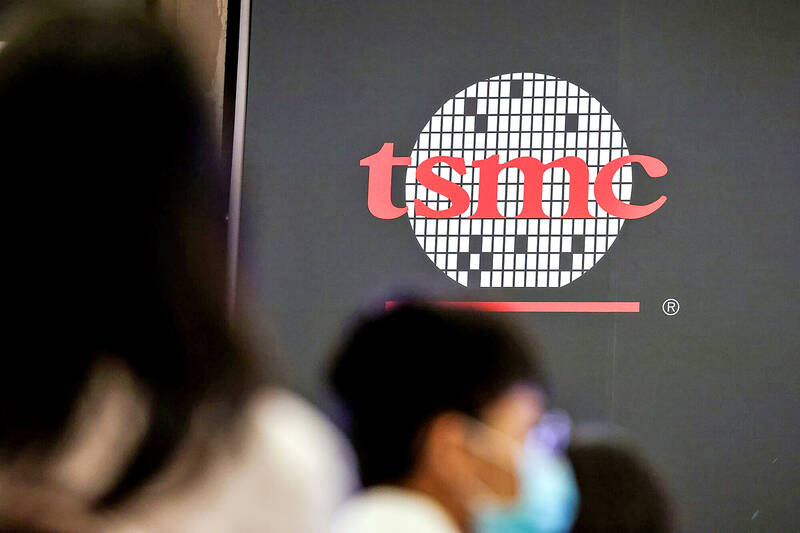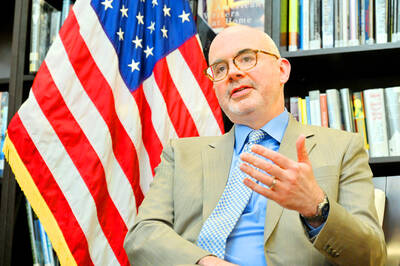Taiwan Semiconductor Manufacturing Co (TSMC, 台積電) yesterday said it expects to receive permanent authorization to continue operating a chip manufacturing factory in Nanjing after being granted an extension to a waiver to supply US chip equipment to its factories in China.
The world’s biggest contract chipmaker said it has been authorized to continue operating in Nanjing, where TSMC is expanding its 28-nanometer chip capacity to satisfy demand.
Last year, the chipmaker received a one-year authorization to operate the Nanjing fab deploying 28-nanometer and 16-nanometer technologies.

Photo: I-Hwa Cheng, Bloomberg
The Chinese market contributed about 12 percent to the company’s total revenue in the second quarter.
“We are in the process of applying for a permanent authorization for our operations in China,” TSMC said in a statement. “We have been advised by the [US] Department of Commerce’s Bureau of Industry and Security to apply for Validated End-User [VEU] authorization, which would serve as a permanent authorization.”
The authorization has existed since 2007, but TSMC has not needed it previously, the chipmaker said.
“We expect to receive a permanent authorization through the VEU process,” TSMC said.
It has a modest campus in a Shanghai suburb and operates a site in Nanjing that makes 16-nanometer chips, four generations behind leading-edge technology.
Samsung Electronics Co and SK Hynix Inc have been effectively granted an indefinite waiver on broader restrictions banning the shipment of advanced US chipmaking gear to China, South Korea’s presidential office said earlier this week.
Sweeping US regulations announced in October last year struck at the heart of Beijing’s tech ambitions, but also cast uncertainty over foreign chipmakers in China, including TSMC and its South Korean peers.
All three firms secured one-year waivers at the time, which allowed them to import vital equipment, but have since grappled with uncertainty over whether the exemptions would be extended.
US President Joe Biden’s administration late last month also removed a stringent curb on expansion in China by semiconductor companies that receive federal funds to build plants in the US.
TSMC and Samsung are expected to secure US subsidies for new facilities in the country.
Separately, TSMC is planning to produce 6-nanometer chips at its second plant in Japan, which is under construction, the Nikkei reported yesterday.
The chips would be manufactured in a new facility that TSMC is planning at its Kumamoto site in southwestern Japan, it said.
Total investment is estimated at ¥2 trillion (US$13.4 billion), with the Japanese Ministry of Economy, Trade and Industry considering providing up to ¥900 billion, the report said.
They would be the most advanced semiconductor products to be made in the country.
The Japanese government is putting together aid for the semiconductor sector as part of an economic stimulus package that would be finalized as soon as the end of this month.
The support would include subsidies for the second TSMC plant.
The ministry has asked for ¥3.35 trillion for this fiscal year’s supplementary budget.
Additional reporting by Bloomberg

SEPARATE: The MAC rebutted Beijing’s claim that Taiwan is China’s province, asserting that UN Resolution 2758 neither mentions Taiwan nor grants the PRC authority over it The “status quo” of democratic Taiwan and autocratic China not belonging to each other has long been recognized by the international community, the Mainland Affairs Council (MAC) said yesterday in its rebuttal of Beijing’s claim that Taiwan can only be represented in the UN as “Taiwan, Province of China.” Chinese Minister of Foreign Affairs Wang Yi (王毅) yesterday at a news conference of the third session at the 14th National People’s Congress said that Taiwan can only be referred to as “Taiwan, Province of China” at the UN. Taiwan is an inseparable part of Chinese territory, which is not only history but

CROSSED A LINE: While entertainers working in China have made pro-China statements before, this time it seriously affected the nation’s security and interests, a source said The Mainland Affairs Council (MAC) late on Saturday night condemned the comments of Taiwanese entertainers who reposted Chinese statements denigrating Taiwan’s sovereignty. The nation’s cross-strait affairs authority issued the statement after several Taiwanese entertainers, including Patty Hou (侯佩岑), Ouyang Nana (歐陽娜娜) and Michelle Chen (陳妍希), on Friday and Saturday shared on their respective Sina Weibo (微博) accounts a post by state broadcaster China Central Television. The post showed an image of a map of Taiwan along with the five stars of the Chinese flag, and the message: “Taiwan is never a country. It never was and never will be.” The post followed remarks

INVESTMENT WATCH: The US activity would not affect the firm’s investment in Taiwan, where 11 production lines would likely be completed this year, C.C. Wei said Investments by Taiwan Semiconductor Manufacturing Co (TSMC, 台積電) in the US should not be a cause for concern, but rather seen as the moment that the company and Taiwan stepped into the global spotlight, President William Lai (賴清德) told a news conference at the Presidential Office in Taipei yesterday alongside TSMC chairman and chief executive officer C.C. Wei (魏哲家). Wei and US President Donald Trump in Washington on Monday announced plans to invest US$100 billion in the US to build three advanced foundries, two packaging plants, and a research and development center, after Trump threatened to slap tariffs on chips made

CONSISTENT COMMITMENT: The American Institute in Taiwan director said that the US would expand investment and trade relationships to make both nations more prosperous The US would not abandon its commitment to Taiwan, and would make Taiwan safer, stronger and more prosperous, American Institute in Taiwan Director Raymond Greene said. “The US’ commitment to Taiwan has been consistent over many administrations and over many years, and we will not abandon our commitment to Taiwan, including our opposition to any attempt to use force or coercion to change Taiwan’s status,” he said in an exclusive interview with the Liberty Times (the sister newspaper of the Taipei Times) on Friday last week, which was published in the Chinese-language newspaper yesterday. The US would double down on its efforts